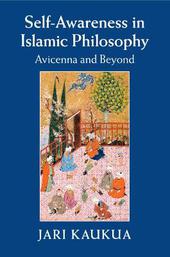
|
Self-Awareness in Islamic Philosophy: Avicenna and Beyond
Paperback / softback
Main Details
| Title |
Self-Awareness in Islamic Philosophy: Avicenna and Beyond
|
| Authors and Contributors |
By (author) Jari Kaukua
|
| Physical Properties |
| Format:Paperback / softback | | Pages:267 | | Dimensions(mm): Height 230,Width 153 |
|
| Category/Genre | Islamic and Arabic philosophy
Philosophy of the mind |
|---|
| ISBN/Barcode |
9781107460805
|
| Classifications | Dewey:126.088297 |
|---|
| Audience | | Professional & Vocational | |
|---|
|
Publishing Details |
| Publisher |
Cambridge University Press
|
| Imprint |
Cambridge University Press
|
| Publication Date |
15 March 2018 |
| Publication Country |
United Kingdom
|
Description
This important book investigates the emergence and development of a distinct concept of self-awareness in post-classical, pre-modern Islamic philosophy. Jari Kaukua presents the first extended analysis of Avicenna's arguments on self-awareness - including the flying man, the argument from the unity of experience, the argument against reflection models of self-awareness and the argument from personal identity - arguing that all these arguments hinge on a clearly definable concept of self-awareness as pure first-personality. He substantiates his interpretation with an analysis of Suhrawardi's use of Avicenna's concept and Mulla Sadra's revision of the underlying concept of selfhood. The study explores evidence for a sustained, pre-modern and non-Western discussion of selfhood and self-awareness, challenging the idea that these concepts are distinctly modern, European concerns. The book will be of interest to a range of readers in history of philosophy, history of ideas, Islamic studies and philosophy of mind.
Author Biography
Jari Kaukua is Academy of Finland Research Fellow in the Department of Social Sciences and Philosophy at the University of Jyvaskyla. He is the author of several articles in journals including Vivarium and History and Theory. This is his first book.
Reviews'Jari Kaukua's Self-Awareness in Islamic Philosophy covers much uncharted territory, probing the problem of self-awareness as conceived by Avicenna and as received and reformulated by his illustrious successors, chief among them Shihab al-Din al-Suhrawardi (d. 1191) and Mulla Sadra (d. 1640). Although the premodern, non-European occupation with the self has already been aptly demonstrated by Richard Sorabji, Kaukua seeks to fill in the gaps with a more sustained account of Islamic models of self-awareness. He approaches this topic with impressive historical range, sensitivity to the many technical nuances inherent in the subject matter, sound philological skills, and forensic philosophical precision ... a major feat and a serious scholarly accomplishment.' Mohammed Rustom, Journal of the American Oriental Society
|